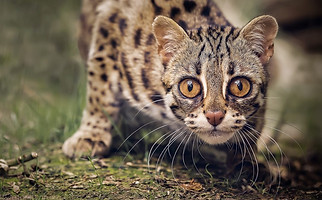The Origins of Bengal

ALC

The breed was developed in the United States and was born more precisely in California, the fruit of the work of a geneticist and passionate breeder, Jean S. Mill. She wanted to create a cat that would look as much like a wild feline as possible. Crossbreeding between American Shorthair and Asian wild cat (Bengal leopard cat) made it possible to achieve this breathtaking result, for the first time in the 1960s; then marriages with different breeds of cat (Siamese in particular) gave the Bengal that we know today. These hybridizations made it possible to refine the silhouette and test the breed's resistance to certain diseases. The Bengal cat was recognized as a breed in the United States in 1983 and imported to France in the 1990s. Although popular in exhibitions, it remains uncommon in homes, making it an exceptional cat.
His look
The Bengal is a very athletic cat.
The expression of the head should be as different as possible from that of the domestic cat. The body is long with powerful musculature and robust bones. The tail, thick at the base, barely tapers to a rounded end. The fur is thick, lying on the body, exceptionally soft and silky to the touch.
One of the main characteristics of the Bengal is its coat.
2 types of patterns are accepted, always with extreme contrast:
-
In the first, called spot or rosette, the spots are either points or rosettes arranged randomly on the body. Rosettes are more or less round spots, open or closed, with a dark outline and tawny interior.
-
In the second pattern, called marble, the rosettes are elongated to produce patterns similar to those of the long-banded panther.

His health
The Bengal cat is not a cat with fragile health but precautions should be taken.
Our Bengal breeders have been selected taking into account their pedigree and the seriousness of their original breeding.
As soon as they arrive at the Cattery, all our cats are placed in quarantine and we carry out all the necessary examinations to ensure their good health.
All our cats are tested for FIV/FELV, PRA b, PKDef, PKD, Coronavirus Felin and HCM.

